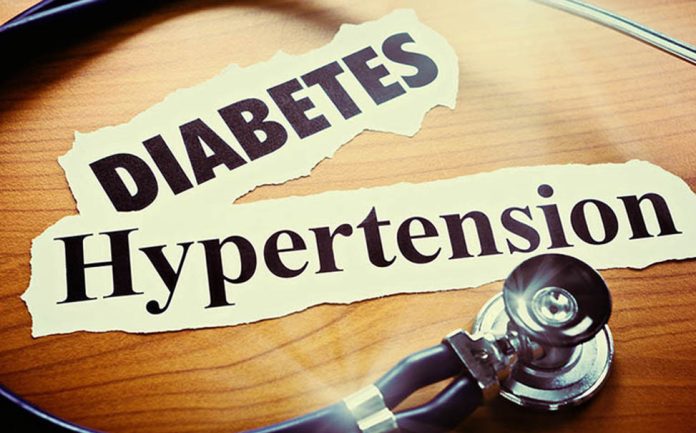Diabetes and hypertension rank among the leading four non-communicable diseases (NCDs) responsible for mortality worldwide. An estimated 537 million people aged 20-79 years are affected by these conditions globally, with over 75% residing in low- and middle-income countries (LMICs).
Alarmingly, nearly half of those affected remain unaware of their diagnosis. Ghana faces numerous health challenges, with some having a more devastating impact than others. Research indicates that NCDs are steadily becoming the leading cause of death in the country, with cardiovascular diseases at the top and diabetes among the top ten.
To address this growing concern, the Ghanaian government, through agencies such as the Ghana Health Service (GHS), has implemented various strategies. Additionally, foreign health partners and non-governmental organizations (NGOs)/social enterprises have joined forces to combat the escalating crisis.
However, the landscape of healthcare in Ghana is set to undergo a significant transformation with the launch of the National Health Insurance Scheme’s (NHIS) Annual Health Check-Ups (AHC) program. This innovative initiative targets one of the country’s most pressing health challenges—non-communicable diseases (NCDs), such as diabetes and hypertension, which have increasingly burdened the population.
With the AHC program, the NHIS aims to shift the focus from reactive to preventive healthcare, offering a proactive approach to managing and mitigating the impact of NCDs.
The Burden of Non-Communicable Diseases in Ghana
Non-communicable diseases are a leading cause of death globally, and Ghana is no exception.
In recent years, the country has seen a marked rise in cases of hypertension, diabetes, and cancer, among other chronic conditions. According to statistics, currently, the prevalence of hypertension is reported between 27% and 34%. On average, one in four adults in Ghana has hypertension. Nearly, less than 35% are aware of their status with only 22% on treatment. In 2021, over 5 million people in Ghana had hypertension.
According to Dr. Patrick Kuma Aboagye, Director General of the Ghana Health Services, NCDs account for more than 40% of all post-mortality cases in the country.
Hypertension, in particular, has become a silent epidemic. Since 2017, it has been the third leading cause of post-mortem admissions and a major contributor to mortality in Ghana. The economic burden of managing these diseases is staggering.
The estimated cost of treating a single case of breast cancer in Ghana is approximately $20,145, while the lifetime cost of managing hypertension can reach up to $119,000. These figures underscore the urgent need for preventive measures to address the growing burden of NCDs such as Diabetes and Hypertension on the country’s healthcare system.
The NHIS Annual Health Check-Ups
In response to this pressing health crisis, the NHIS has introduced the Annual Health Check-Ups (AHC) program. This initiative is designed for citizens aged 18 and above who are registered with the NHIS and possess a Ghana Card.
The AHC program includes a comprehensive package of health screenings: blood pressure checks, blood sugar tests, body mass index (BMI) assessments, and counseling sessions. These screenings are crucial for the early detection of potential health issues, particularly those related to NCDs.
The program is not just about testing; it represents a paradigm shift in the way healthcare is delivered in Ghana. By encouraging citizens to undergo regular health check-ups, the NHIS aims to promote a culture of preventive healthcare. This approach is expected to reduce the burden of serious health conditions, improve the quality of life for Ghanaians, and ultimately, decrease the overall cost of healthcare.
Accessibility and Implementation
One of the standout features of the AHC program is its accessibility. Eligible beneficiaries can enroll in the service by dialing a USSD short code, which will be announced soon. This code will allow them to generate an Access Ticket on their mobile phones during their birth month, making the process straightforward and user-friendly. The program will be implemented nationwide, with services available at designated public and private health facilities.
This accessibility is crucial, as it ensures that all citizens, regardless of their location, can benefit from the program. The initiative is a testament to the NHIS’s commitment to equitable health access, ensuring that even those in the most remote areas can participate in these vital health screenings.
The Importance of Preventive Healthcare
Preventive healthcare is increasingly recognised as a cornerstone of effective health management. Dr. Ernest K.P. Kwarko, Board Chairman of the National Health Insurance Authority (NHIA), emphasized this point during the launch of the AHC program. He noted that early detection and intervention are key to preventing serious health conditions, reducing the burden of diseases, and improving overall quality of life.
The benefits of preventive healthcare are well-documented. Regular health check-ups can lead to the early detection of conditions such as hypertension and diabetes, allowing for timely interventions that can prevent complications. For instance, managing high blood pressure before it leads to more severe cardiovascular issues can significantly reduce the risk of heart attacks and strokes. Similarly, early detection of high blood sugar levels can help prevent the onset of full-blown diabetes, which, if left unchecked, can lead to complications such as kidney failure, blindness, and amputations.
The AHC program also includes counseling sessions, which play a critical role in educating citizens about healthy lifestyles and preventive measures. These sessions provide an opportunity for healthcare providers to engage with patients, offering personalized advice on diet, exercise, and other lifestyle factors that can help prevent the onset of NCDs.
A Holistic Approach to Health
The AHC program is not just about addressing the current health issues in Ghana; it is also about laying the foundation for a healthier future. By focusing on preventive care, the NHIS aims to increase life expectancy and reduce the cost burden of curative healthcare. The initiative’s broader goals include accelerating the achievement of universal health coverage and contributing to the Sustainable Development Goals, particularly Goal 3, which focuses on health and wellness.
In addition to the core screenings offered through the AHC program, the NHIA has plans to introduce additional interventions in the future. For example, the introduction of Pap smear tests for women will further expand the scope of preventive care, addressing another critical area of women’s health. These planned expansions reflect the NHIA’s commitment to comprehensive healthcare, ensuring that all aspects of citizens’ health are addressed.
Addressing the Financial Barriers
One of the significant challenges in accessing healthcare in Ghana is the financial barrier that many citizens face. The high cost of medical treatment often prevents people from seeking care until it is too late. By offering free annual health check-ups, the NHIS is removing this barrier, making essential health services accessible to all citizens.
Dr. Patrick Kuma Aboagye acknowledged the economic burden of NCDs and expressed optimism that the AHC program would be a game-changer in Ghana’s healthcare landscape. The initiative is expected to complement existing service delivery efforts, providing a much-needed boost to preventive healthcare in the country.
A Call to Action
The launch of the AHC program is a significant step forward in Ghana’s healthcare journey. However, for the initiative to achieve its full potential, it requires the active participation of all citizens. Dr. Kwarko urged all Ghanaians to take advantage of the free service, stressing that preventive healthcare is crucial for leading healthier lives.
This call to action is particularly important in a country where the burden of NCDs is on the rise. By participating in the AHC program, citizens can take control of their health, ensuring that they are aware of any potential health issues before they become serious. This proactive approach is essential for reducing the incidence of NCDs and improving the overall health of the population.
The NHIS Annual Health Check-Ups program represents a bold and innovative approach to tackling the burden of non-communicable diseases in Ghana. By shifting the focus from curative to preventive care, the initiative has the potential to transform the country’s healthcare landscape, improving the quality of life for millions of Ghanaians.
The success of the program, however, depends on the collective effort of all stakeholders—citizens, healthcare providers, and the government. It is a shared responsibility to ensure that this initiative achieves its goals, paving the way for a healthier, more prosperous Ghana. As the program rolls out nationwide, it is hoped that it will serve as a model for other countries in the region, demonstrating the power of preventive healthcare in improving public health outcomes.








